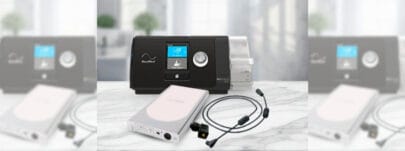
Finding the Best CPAP Batteries for Uninterrupted Sleep Therapy
Obstructive sleep apnea is a disorder that results in interrupted sleep. Interruptions are a result of frequent breathing pauses caused by obstructed airways. In cases of moderate to severe obstructive sleep apnea, continuous positive airway pressure (CPAP) therapy is recommended as a primary treatment.
CPAP uses a device that delivers pressurized air through a mask worn as you sleep. This helps prevent the collapse of the tissues in the airways, allowing a continuous supply of air to the lungs. A CPAP device is normally powered directly from an electrical outlet in your home.
However, there can be times when you are traveling and do not have access to a power outlet. Lengthy power cuts can also create problems for CPAP users.
Finding the best CPAP batteries for your device means you can consistently stick to your obstructive sleep apnea treatment even when a mains power outlet is unavailable.
Choosing the Best CPAP Batteries
Choosing the best CPAP batteries for your device is an important purchasing decision. Even a single day without using CPAP can see a return of your debilitating obstructive sleep apnea symptoms.
When you are away from home without access to an electrical main outlet, packing batteries to power your CPAP device is key. Some countries you visit may also have different electrical outlets. Having batteries at home is also a good idea in case of an unforeseen power cut.
Several factors need consideration when choosing the best CPAP batteries.
1. CPAP Device Compatibility
This is perhaps the most important consideration, as not all batteries are compatible with all CPAP devices. It is important to do your research and take advice if need be, as some manufacturers produce batteries that are only compatible with their own CPAP devices.
Besides the risk of not correctly powering up your CPAP device, an incompatible battery can damage and shorten the lifespan of your device.
2. Battery Run Time
This is another key consideration, as you want batteries that will run for the entire duration of your sleep. If you enjoy eight hours of sleep every night, you should be seeking out batteries with a run time of eight hours or more.
In truth, most batteries last one to three days when fully charged. Therefore, run time may be more relevant when you do not have access to an electrical outlet every day – when camping, for example. However, longer run times can add to the cost of batteries.
3. Cost
With regards to cost, budget will be an important consideration for many people when seeking out the best CPAP batteries. Batteries can range in cost from $200 to $600, which is a significant investment for many. It is tempting to opt for the lower end if budget-conscious, but it pays to do your homework before opting for affordability over quality.
The less expensive batteries tend to have a lower performance. This could be a lower run time or they take longer to charge. Consider pairing the price against other requirements in order to find the best CPAP batteries for you.
4. Charge Time
The time batteries take to charge will be an important consideration when traveling. If you don’t have regular access to a power outlet you will want batteries that can fully charge in as short a time as possible. Otherwise, the battery run time will reduce when not fully charged and may not cover the duration of your sleep.
The Medistrom Pilot-24 Lite Battery and Backup Power Supply is an example of a battery with a decent charge time of 8 to 16 hours. This can make it a suitable choice when traveling and you do not have regular access to an electrical outlet.
5. Lifespan
Some manufacturers advertise the predicted lifespan of their batteries in terms of how many charges you can expect. For example, the Sunset Portable Outlet UPS CPAP battery is rated for 500 cycles, making it suitable in areas that experience frequent power outages.
A more durable battery should also typically mean a longer lifespan. This will depend on the battery’s design: ideally one that won’t damage easily when traveling.
6. Capacity
A higher-capacity battery tends to have a longer running time. This capacity is measured in milliamps per hour (mAH), although outside factors, including temperature, can impact a battery’s capacity to store energy.
7. Portability
As CPAP batteries are commonly used away from home, portability is important to consider. The smaller the battery and the lower its weight, the easier it will be to travel with.
The Somnetics Transcend Portable Battery is considered especially suitable for frequent travelers. The battery is small enough to fit in the palm of your hand, and the P4 version of the battery only weighs 0.6 pounds (272 grams).
Another Useful Item to Take on Your Travels
If you occasionally need to charge CPAP batteries in your car, an inverter is a useful piece of kit to have with you on your travels. CPAP batteries are charged using AC power, as the majority of electrical systems in the US rely on AC power.
However, your car is likely to have a DC power outlet. An inverter will allow you to transform this DC power into the AC power required by CPAP batteries. This is essential for those who want to continue treating obstructive sleep apnea while on the road.
Finding the best CPAP batteries is important for uninterrupted obstructive sleep apnea therapy. First and foremost, CPAP batteries need to be compatible with your CPAP device so they can continue to power your device when a main power outlet is unavailable or during a power cut.
Then, battery compatibility, run time, charge time, capacity, lifespan, and portability are all important considerations.
While CPAP batteries are an investment, most come with a 1-year warranty – be sure to confirm this before making your purchase.
Source: https://www.sleepfoundation.org/best-cpap-supplies/best-cpap-battery



